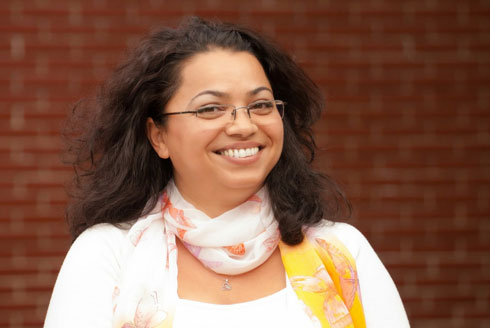Health mediators in Bulgaria are using an attractive vaccine schedule to tackle low vaccination rates in Bulgaria’s Roma communities
Antoaneta Eftimova is now in her fourth year working as one of two health mediators in Blagoevgrad, western Bulgaria. She and her colleague Katia help about 2,000 people living in the three Roma neighbourhoods to get better access to health services. Antoaneta graduated secondary education and this year she started her university education. She speaks Bulgarian, Turkish and Roma languages.

One of her daily tasks is to inform mothers from the neighborhoods about the importance of vaccinations, paying special attention to young mothers and mothers with many children.
Antoaneta works with an attractive vaccination schedule and has already taught many mothers how to follow the vaccinations of their children. In parallel with this, she works with GPs and searches for children who have missed vaccinations. The three GPs serving most of the Roma patients call her when there are children with missed vaccinations – they give her a list with the names and her task is to find them and convince the parents to bring them to the GP.

Usually parents miss vaccination when they decide to travel abroad. The health mediator tries to prevent such incidents by collecting information about when the families plan to come back and then she contacts them right after their return in order to bring their children for vaccination.
During the last few months, more than 90 children were reached by the health mediator because of missed vaccines. Antoaneta is content when she sees mothers bringing their children to the GP without notice – for her it is a sign that the mother is already convinced about the importance of vaccination.

Very often the mothers prefer that the health mediator accompanies them to the GP because they feel more confident with her. Sometimes the GPs are not able to convince the parents that a vaccine is important. Antoaneta takes on these cases and solves the issues with a lot of patience, adapted information and an individual approach.
In her practice there were only two occasions when she and the GPs were unable to convince the parents to vaccinate their children. A mother suffering from diabetes was convinced that her child had diabetes too and refused to vaccinate – neither the GP nor the health mediator were able to assure her that her child is not ill and a vaccine wouldn’t be harmful.
Another case was a grandmother who lost one of her grandchildren soon after vaccination because of an autoimmune disease which was not proved to be linked to the vaccination. However, she was determined not to let his cousin be vaccinated.
Recently Antoaneta started to work on vaccination issues with pregnant women as well. She tries to prepare them in advance for the need to take care of their babies’ health and gives them adapted materials.
She explains that it is important for them to know about the vaccination schedule in order to take informed decisions and feel involved in the process. In addition, both mothers and children really like the design of the immunization calendar-sticker with the ladybirds on it showing the right time for administering a vaccine.
This calendar is easy to understand, even for families with low education status. The schedule points out not only the official names of the vaccine-preventable diseases but also their “popular” names that people use in their daily lives.



